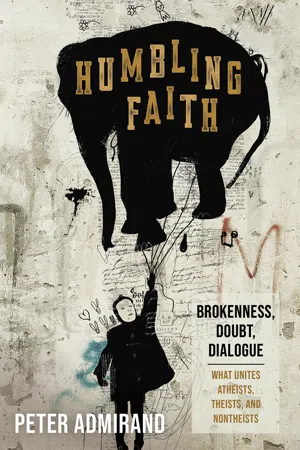![]()
1
Hubris and Its Modest Foe
Jewish, Muslim, and Christian Views
There is something slimy, slippery, and self-serving when endorsing humility. In reflecting upon it, we should shudder and stutter like Moses before the burning bush: sibilance par excellence. For such hissing and rasping should be a warning: humility, sadly, can embody the sinister and serpentine, sloughing and shedding what is good, noble, and true.105 Failures in humility come at great cost: an excess of humility primarily injures oneself; a lack of humility primarily injures others. Either way, suffering and pain increase.106 Too many of us think writing the word “humility” (like despots quote “democracy”) garners a modest mien and estimation. Instead, apertures open for revealed hypocrisy and duplicity.
Ultimately, learning from one another is the tinder for any lasting humility to remain alight within and for others. Think of humility like a controlled fire removing the detritus, dead wood (of excessive pride), and other dross. It can seem destructive but the result can be moral growth, verdure, and regeneration. Of course, controlled fires are rarely controlled;107 and humility, like fire misused and left rampant, can be dangerous.108 But without humility, a different means of self-destruction is almost guaranteed. Think of such lack as a type of moral spontaneous human combustion, if not metaphorical then literal as depicted of the alcoholic Mr. Krook in Dickens’s Bleak House.109 Humility is life-sustaining and life-giving, but comes with a warning to use with care.
This chapter assesses some key resources and texts on humility, principally in the Christian tradition, but also drawing upon Jewish sources, notably in the Tanach and the Talmud, and from the third Abrahamic faith, Islam.110 But first: opening thoughts on humility without God.
Godless Humility, Part I
In the introduction I espoused a spunky humility (or humbled pride).111 Shakespeare, for example, couldn’t credibly claim he was a middling playwright. The humble should be immersed in reality as Jon Sobrino notes, especially in solidarity with the poor and oppressed.112 Here, theists and nontheists both suffer, are immersed in the causes, or work for healing.
Can only God truly humble us? Perhaps, but don’t I feel humbled in the presence of the Grand Canyon, wild elephants, an exploding supernova, or a sugar cube’s intricacies? I do, but this awe stems more from the wild and fruitful diversity of creation by a Creator. Cynically, humans destroy such things with indifference, even glee. While some boast (others lament) of God’s death, I cling to the idea that God as a mystery, source, question, and (ultimate) quest mirrors our search for meaning and purpose. To alter such an attribute would seem to alter humanity’s fiber and essence. God doesn’t vanish by claiming God’s demise. Does not a haunting and spectral afterglow remain?
Of God in Auschwitz, Elie Wiesel questions: “Why do you go on troubling these poor people’s wounded minds, their ailing bodies?”113 Here God seems mere echo and nuisance, an enervating remnant of guilt preying on the weak and defenseless; a type of phantom faith-itch. Or maybe God’s presence can still be glimpsed amidst our moral decrepitude? Remember that for Wiesel, belief in God (which amounts to wrestling with God) restores and maintains some sense of hope and meaning in this world.114 Even great human beings are still flawed, yearning, frail, and seeking. The saint and the heroic and, sadly, the murderer and degenerate, are still like us in many ways (think Shylock’s “hath not a Jew eyes” speech,115 or Buddhist interdependence).
The tinges of awe and humbling before creation, then, are not as pervasive and magnanimous as the existence of a Creator God, for whom one may rail and curse, deny and “kill,” but who still seems to remain, ever remain, as long as we, and the intricacies and convulsions of life, remain.
And yet, perhaps needing God for authentic humility is a sign of my own weakness and pride. If there is no God so now anything (supposedly) goes, then the genuinely humble still respect and dignify others in their words, gestures, and actions. Is true humility only possible for atheists? Should humility be easier for theists—another reason theists should be humble? Or is humility too tainted by patriarchal, anti-womanist, and anti-marginalized voices to be retrieved for any lasting or foundational role today? I’ll return to secular humility in chapter 5.
Humility, Judaism, and the Tanach
Humility has been fiercely claimed (with a dearth of humility) by many Christians. But as a virtue or moral quality, it is neither contained nor solely represented in any one tradition. Christians may highlight Jesus as the highest embodiment of that term. Non-Christians would humbly offer their own exemplars. The Hasidic Rebe, Menahem-Mendl of Kotzk, for example, said of [Zusia of Lizensk]: “Just as there are scientific geniuses, there is one in matters of humility, and I mean Rebbe Zusia.”116 Zusia was a renowned figure of Galician Hasidism, along with his brother Elimelekh. Many other examples could be cited. Any Christian conception must begin with the Tanach and Jewish tradition.
“The virtue of humility,” Daniel M. Nelson writes, “was central to the moral-religious understanding of tradit...
